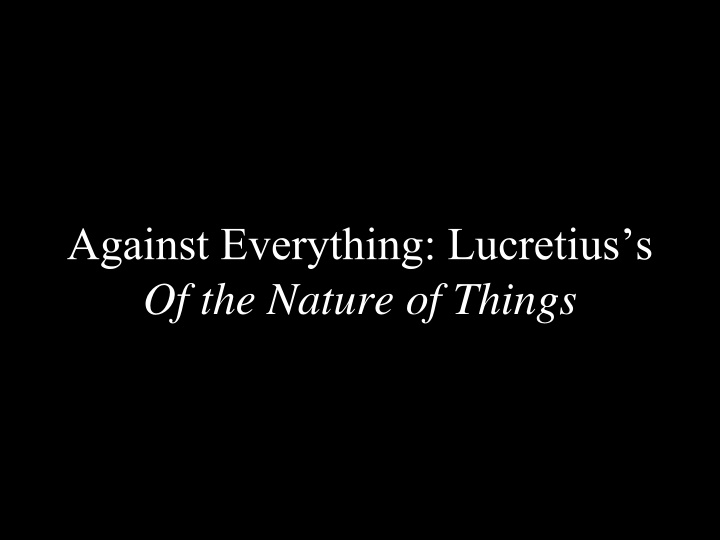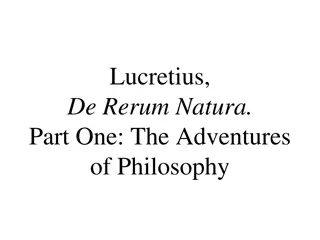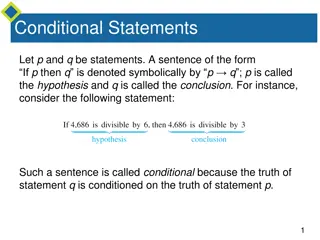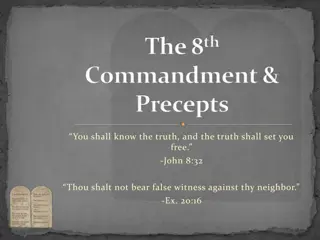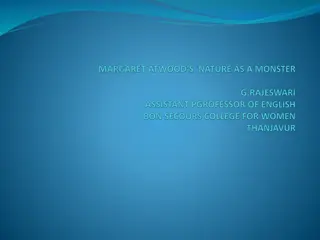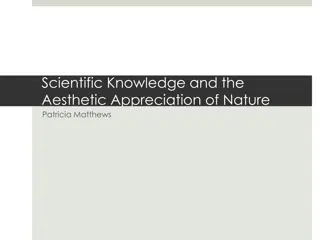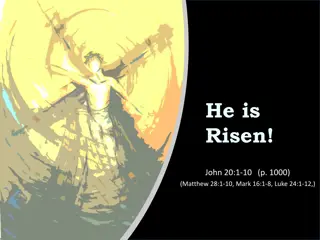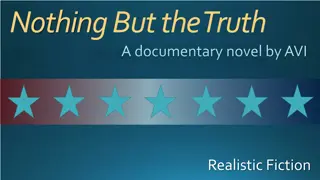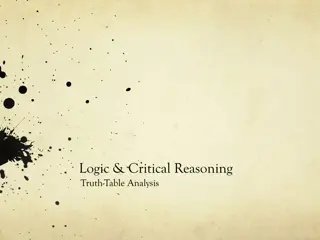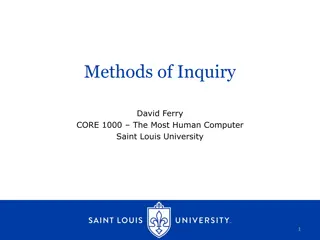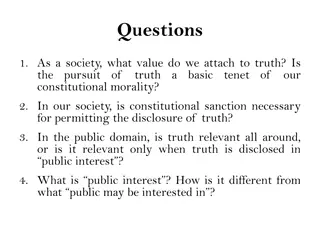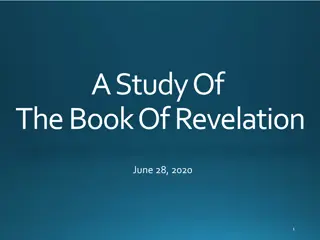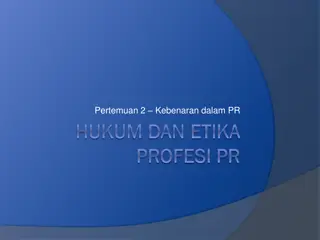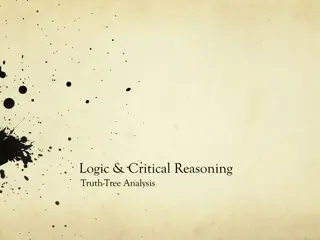Unveiling Truth: Insights from Lucretius's "Of the Nature of Things
Delve into the profound philosophical musings of Lucretius, challenging superstition, fear, and fate while advocating for knowledge, pleasure, and free will. Explore the timeless wisdom of ancient Greek thinkers who dared to defy conventional beliefs and seek truth in a universe filled with endless mysteries and possibilities.
Download Presentation

Please find below an Image/Link to download the presentation.
The content on the website is provided AS IS for your information and personal use only. It may not be sold, licensed, or shared on other websites without obtaining consent from the author.If you encounter any issues during the download, it is possible that the publisher has removed the file from their server.
You are allowed to download the files provided on this website for personal or commercial use, subject to the condition that they are used lawfully. All files are the property of their respective owners.
The content on the website is provided AS IS for your information and personal use only. It may not be sold, licensed, or shared on other websites without obtaining consent from the author.
E N D
Presentation Transcript
Against Everything: Lucretiuss Of the Nature of Things
Happy he who was able to know the causes of things, and who trampled beneath his feet allfears, inexorable fate, and the roar of devouring hell. Virgil, Georgics, 2.490-2
(1) Happy he who was able (2) to know the causes of things, and who (3) trampled beneath his feet all fears, (4) inexorable fate, and the roar of (5) devouring hell. Happiness: maximize pleasure, minimize pain; against sin Knowledge: the explanation of everything; against illusion Against fear, especially fear of death Against fate, for free will Against afterlife; mortality of the soul
I follow you, glory of the Greek race, as in your footprints I now plant my own, not so much out of any desire to compete with you as for love, for my wish is to imitate you You are our father, the discoverer of reality. You pass to us your paternal precepts, and from your scrolls, glorious one, just as bees sip all they can find in the flowery glades, we likewise feed upon all of your golden words golden, and ever deserving of perpetual life. 3.3 13
When all could see that human life lay groveling ignominiously in the dust, crushed beneath the grinding weight ofsuperstition, which from the celestial regions displayed its face, lowering over mortals with hideous scowl, the first who dared to lift mortal eyes to challenge it, the first who ventured to confront it boldly, was a Greek. This man neither the reputation of the gods nor thunderbolts nor heaven s menacing rumbles could daunt; rather all the more they roused the ardor of his courage and made him long to be the first to burst the bolts and bars of nature s gates. 1.61-69
And so his minds might and vigor prevailed, and on he marched far beyond the blazing battlements of the world, in thought and understanding journeying all through the measureless universe; and from this expedition he returns to us in triumph with his spoils: knowledge of what can arise and what cannot, and again by what law each thing has its scope restricted and its deeply implanted boundary stone. So now the situation is reversed: superstition is flung down and trampled underfoot; we are raised to heaven by victory. 1.61-79
For it is inherent in the very nature of the gods that they should enjoy immortal life in perfect peace, far removed and separated from our world; free from all distress, free from peril, fully self-sufficient, independent of us, they are not influenced by worthy conduct nor touched by anger. 1.44-49
It occurs to me that this activity [of the atoms] is mirrored and reflected in a phenomenon of our everyday experience. Watch carefully whenever shafts of streaming sunlight are allowed to penetrate a darkened room. You will observe many minute particles mingling in many ways in every part of the space illuminated by the rays and, as though engaged in ceaseless combat, warring and fighting by squadrons with never a pause, agitated in frequent unions and disunions. You can obtain from this spectacle a conception of the perpetual restless movement of the primary elements in the vast void, insofar as a trivial thing can exemplify important matters and put us on the track to knowledge. 2.113-125
The existence of matter is proved by universal sensation; and unless in the first place trust in sensation is established as an unshakable foundation, there will be no criterion to which we can refer in the case of things hidden from view in order to verify any matter by reasoning. 1.422-425
Nothing can come from nothing. Nothing can be reduced to nothing.
When the atoms are being drawn downward through the void by their property of weight, at absolutely unpredictable times and places they deflect slightly from their straight course, to a degree that could be described as no more than a shift of movement. If they were not apt to swerve, all would fall downward through the unfathomable void like drops of rain; no collision between primary elements would occur, and no blows would be effected, with the result that nature would never have created anything. 2.217-227
If all movements are invariably interlinked, if new movement arises from the old in unalterable succession, if there is no atomic swerve to initiate movement that can annul the decrees of destiny and prevent the existence of an endless chain of causation, what is the source of this free will possessed by living creatures all over the earth? What, I ask, is the source of this power of will wrested from destiny, which enables each of us to advance where pleasure leads us, and to alter our movements not at a fixed time or place, but at the direction of our own minds? 2.252-262
Gilgamesh, where are you hurrying to? You will never find that life for which you are looking. ( ) As for you, Gilgamesh, fill your belly with good things; day and night, night and day, dance and be merry, feast and rejoice. Let your clothes be fresh, bathe yourself in water, cherish the little child that holds your hand, and make your wife happy in your embrace; for this too is the lot of man.
